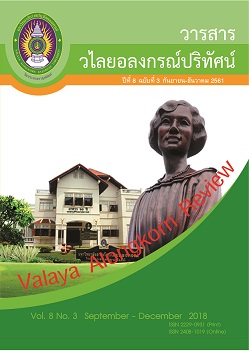การเรียนรู้โดยใช้โครงงานเพื่อพัฒนาผู้เรียนในศตวรรษที่ 21
คำสำคัญ:
การเรียนรู้โดยใช้โครงงาน, ศตวรรษที่ 21บทคัดย่อ
การเรียนรู้โดยใช้โครงงาน เป็นรูปแบบหนึ่งของการเรียนรู้ในศตวรรษที่ 21 ที่ส่งเสริมให้ผู้เรียนค้นคว้าหาความรู้ สร้างองค์ความรู้ด้วยตนเองซึ่งสอดคล้องกับแนวคิดการเรียนรู้ที่ยึดผู้เรียน เป็นสำคัญ เป็นการเรียนรู้เกิดจากการปฏิบัติจริง จากการหาความรู้ และการลงมือกระทำ มีความสามารถในการใช้ความรู้นั้น ๆ เป็นสิ่งที่สำคัญที่สุด การเรียนรู้โดยใช้โครงงานนั้น ผู้เรียนสามารถเชื่อมโยงความรู้เดิมหรือประสบการณ์เดิมกับความรู้ใหม่แล้วสามารถนำไปประยุกต์ใช้ได้อย่างเหมาะสม ขั้นตอนการเรียนรู้โดยใช้โครงงาน ประกอบด้วย (1) ขั้นการนำเสนอ (2) ขั้นวางแผน (3) ขั้นปฏิบัติ และ (4) ขั้นประเมินผล ทุกขั้นตอนมีการทำงานแบบความร่วมมือที่ฝึกการเป็นผู้นำ ผู้ตาม ยอมรับฟังความคิดเห็นของผู้อื่น และให้เกียรติซึ่งกันและกัน คุณค่าของการเรียนรู้แบบโครงงานเป็นการเรียนรู้ ที่สร้างทักษะการเรียนรู้ ทักษะการคิดสร้างสรรค์ ทักษะทางอารมณ์ ทักษะการสื่อสารหรือ การนำเสนอที่สร้างความเข้มแข็งต่อผู้เรียนอย่างต่อเนื่องและยั่งยืน
เอกสารอ้างอิง
ปรีดี ปลื้มสำราญกิจ. (2560). ปัจจัยที่มีผลต่อทักษะในศตวรรษที่ 21 ของผู้เรียน. วไลยอลงกรณ์ปริทัศน์. 7(3): 141-158.
พิมพันธ์ เดชะคุปต์ และพเยาว์ ยินดีสุข. (2551). ทักษะ 5 C เพื่อการพัฒนาหน่วยการเรียนรู้และการจัดการเรียนการสอนอิงมาตรฐาน. (พิมพ์ครั้งที่ 6). กรุงเทพฯ: โรงพิมพ์แห่งจุฬาลงกรณ์มหาวิทยาลัย.
เยาวมาลย์ อรัญ. (2560). การพัฒนาชุดกิจกรรมการเรียนกับเทคนิคคิดเดี่ยว-คิดคู่-คิดร่วมกัน (Think-Pair-Share) เพื่อส่งเสริมทักษะกระบวนการทางวิทยาศาสตร์ สำหรับนักเรียนชั้นประถมศึกษาปีที่ 6. วิทยานิพนธ์ศึกษาศาสตรมหาบัณฑิต สาขาวิชาหลักสูตรและการสอน มหาวิทยาลัยธุรกิจบัณฑิตย์.
อภิรักษ์ กุลชุตินธร. (2559). การพัฒนาการเรียนรู้วิชาวงจรไฟฟ้ากระแสตรงโดยใช้โครงงานของนักเรียนชั้นมัธยมศึกษาปีที่ 2 โรงเรียนศีลาจารพิพัฒน์. วิทยานิพนธ์ศึกษาศาสตรมหาบัณฑิต สาขาวิชาหลักสูตรและการสอน มหาวิทยาลัยธุรกิจบัณฑิตย์.
อาทิตยา เพ็ญไพบูลย์. (2559). การพัฒนาการเรียนรู้วิชาฟิสิกส์โดยใช้โครงงานของนักเรียนชั้นมัธยมศึกษาปีที่ 4 โรงเรียนมัธยมวัดหนองจอก. วิทยานิพนธ์ศึกษาศาสตรมหาบัณฑิต สาขาวิชาหลักสูตรและการสอน มหาวิทยาลัยธุรกิจบัณฑิตย์.
Adam, D. M. & Hamm, M. (1994). New designs for teaching and learning. San Francisco: Jossey-Bass.
Bender, W. N. & Waller, L. (2011). The Teaching Revolution. Corwin: California.
Johnson, D. W., & Johnson, R. T. (1987). Learning Together and Alone. New Jersey: Prentice - Hall.
Johnson, D. W., & Johnson, R. T. (1994). Leading the cooperative school. (2nd ed.). Edina, MN: Interaction Book Company.
Johnson, D. W., & Johnson, R. T. (1999). Making Cooperative Learning Work. Theory into Practice. 38(2): 67-73.
Johnson, D. W., Johnson, R. T. & Smith, K .A. (1991). Cooperative Learning Increasing College Faculty Instructional Productivity. Higher Education Report No.4. Washington D. C.: The Geoge Washington University.
Johnson, D. W., & Johnson, R. (1994). Leading the cooperative school. (2nd ed.). Edina, MN: Interaction Book.
Slavin, R. E. (1990). Cooperative Learning: Theory, Research and Practice. New Jersey: Prentice - Hall.
ดาวน์โหลด
เผยแพร่แล้ว
รูปแบบการอ้างอิง
ฉบับ
ประเภทบทความ
สัญญาอนุญาต
ข้อความที่ปรากฏในบทความแต่ละเรื่องในวารสารวไลยอลงกรณ์ปริทัศน์ เป็นความคิดเห็นของผู้นิพนธ์แต่ละท่าน มิใช่เป็นทัศนะและมิใช่ความรับผิดชอบของกองบรรณาธิการจัดทำวารสาร และ
มหาวิทยาลัยราชภัฏวไลยอลงกรณ์ ในพระบรมราชูปถัมภ์


